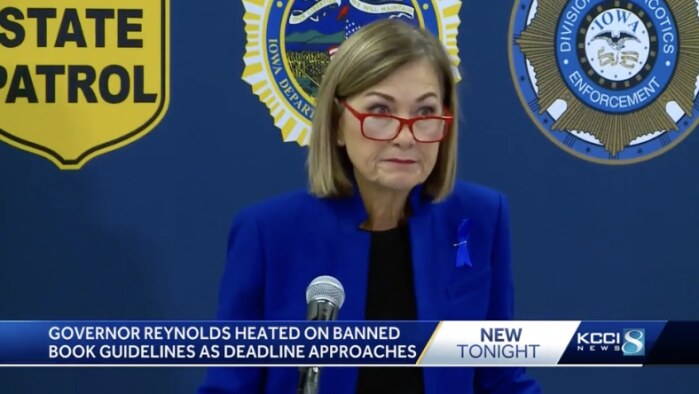Bruce Lear lives in Sioux City and has been connected to Iowa’s public schools for 38 years. He taught for eleven years and represented educators as an Iowa State Education Association regional director for 27 years until retiring.
In a hearing, I always knew when the lawyer on the other side didn’t have a good case. Instead of focusing on facts, they shouted and pounded the table more in hopes the arbitrator might forget and get distracted by a loud passionate argument.
That’s what Governor Kim Reynolds tried during her October 25 press conference, when asked about book banning in public schools.
By the way, I’ve noticed those shouting about removing books never want to be called “book banners.” Maybe they know deep down that historically, book banners have never been the good guys.
The facts are not on Reynolds’ side, so she shouted, ridiculed, and condescended to public school teachers and administrators looking for specific guidance about the new education law.
She did, however, get two things right. At the beginning of her rant, she said, “We are way off course. Our kids and teachers deserve better […].” She is correct: Iowa schools are off course, and they do deserve better.
But it’s not administrators and educators who are off course. Lawmakers passed and Reynolds signed a vague, “gotcha law,” known as Senate File 496. The Iowa Department of Education is refusing to provide guidance to school districts until December 28, 2023, even though the law’s restrictions on books and classroom materials must be enforced by January 1, 2024. That leaves school administrators scrambling to decide how the new law might be followed.
Senate File 496 requires school libraries to include only “age-appropriate” material, stipulating that “age-appropriate” “does not include any material with descriptions or visual depictions of a sex act” as defined in another code section.
At one point, Iowa House Republicans amended the bill to prohibit material containing “graphic descriptions or visual depictions of a sex act,” which would have excluded a smaller number of books. But before final passage, Senate Republicans removed the word “graphic” from the text.
Pretending to be embarrassed, Reynolds spent a good deal of time during last week’s press conference reading from the Iowa Code defining a sex act. She asserted, “We are way off course. Our kids and our teachers deserve better, they deserve the tools to help these kids succeed, not a damn distraction on a nasty pornographic book that should never, ever be in a classroom.”
But the governor forgot to mention the true “gotcha” part of the law. It’s not the definition of sex act that has school officials scratching their heads. It’s the term “age-appropriate.”
The law is confusing because the it doesn’t say whether a single passage in a book might make it unsuitable for older students, or whether the overall subject matter determines age appropriateness.
During legislative debates on the bill, supporters read selected passages for shock value and characterized some books as pornographic. That might be fun in a debate, but it doesn’t offer clarity. (Editor’s note from Laura Belin: Under longstanding Iowa law, “obscene material” is defined to cover sexual or abusive content in a work that “taken as a whole, lacks serious literary, scientific, political or artistic value.” Many of the books targeted by Republican lawmakers have won awards for adolescent literature.)
Reynolds went on to tell reporters, “I think it’s pretty clear, and if they can’t distinguish that maybe we ought to take a look at what they should be dealing with.” She claimed the controversy was “just a distraction,” and accused critics of “blowing it out of proportion.”
The problem is, the Reynolds administration has never told administrators and teachers how to interpret this part of the sweeping new education law.
“Age-appropriate” is a subjective term, but violating this vague provision could put careers at risk and earn the wrath of groups like Moms for Liberty.
Since the law bans any instruction on gender identity or sexual orientation from kindergarten through sixth grade, many educators wonder whether all books referring to LGBTQ people need to be removed. And administrators are left wondering whether the targeted books (many by authors who are part of marginalized communities) will be allowed even in upper grades. That’s a huge part of the “gotcha” surrounding this law as well.
Republicans touted Senate File 496 as “parents’ rights” legislation. In fact, the law gave a few parents the right to make key decisions, undermining the rights of other parents. The losers include those who want their children to have instruction about gender identity, or to read literature that may include references to sex.
Make no mistake, this law is working just like its creators envisioned. It has sown doubt about what’s going on in public schools in some communities, turning some school board races into partisan brawls.
It has created fear and confusion, spurring some public school administrators to remove books out of “an abundance of caution.”
But the real losers are students wanting to learn and be comfortable in their own skin. The governor can pound the table all she wants in one of her rare press conferences. The reality is, this law hurts Iowa schools and hurts Iowa communities.
Top image: Screenshot from KCCI-TV journalist Pepper Purpura’s report on Governor Kim Reynolds’ October 25 news conference.


1 Comment
I think the Gov is who she says she is, am I wrong?
is there any evidence that the Gov knows better than conspiracy theories she gives to justify her actions?
Seems more likely that she truly thinks we are making a big deal out of nothing (what she takes to be common sense) just to try and demonize her (and or push our cultural marxist agenda), as everything I’ve seen suggests that she is a true believer, but would be glad to be proven wrong.
dirkiniowacity Mon 30 Oct 7:31 PM